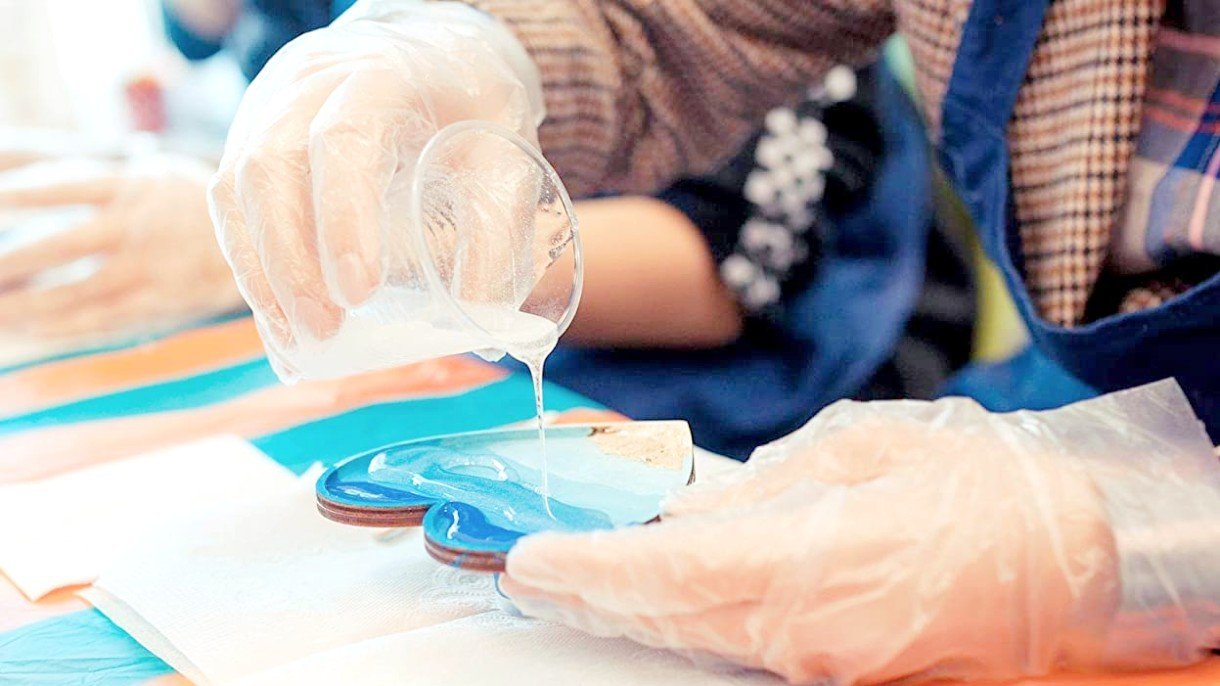Is Resin Environmentally Friendly?

Resin has become a very popular material in decor and jewelry in recent years. Many people across the world now either buy resin products or create their own, with resin art seeing a massive boost across social media.
Since the 1930s, synthetic resin has primarily been used for industrial purposes, used to coat flooring or in adhesives, and is now more available for artists and creators. is used to create all manner of decor – especially coasters and jewelry.
Is resin bad for the environment?
Because there are so many different types of resin out there, it’s difficult to say whether all resins are bad for the environment or if only some are.
Natural resins from plants have been used for centuries as varnishes and glazes. Pine resin was used as an adhesive in the prehistoric ages to glue tools together. There’s no harm in using beeswax or natural materials found in nature, but these generally aren’t used in art resins.
Most casting resins used for resin art are synthetic resins made from chemicals. They are usually classed as irritants due to the effect chemicals can have on skin and when in contact with the eyes, but their vapors can also have a major impact on respiratory health.
Most common types of resin
There are four common types of resin used in casting, and each has its own advantages and disadvantages. I’m going to go through this purely on what I can find about how safe they are – for humans and for the environment.
These resins come with their own manufacturing instructions on how to use them and how to dispose of them – and most require protective gear to avoid skin contact and inhaling vapors.
- Polyester/fiberglass resin is generally the cheapest resin. It’s also the most toxic – inhaling fumes from this resin can cause respiratory problems, irritate eyes and skin, and its chemicals are water polluting. Polyester resins are often made using styrene, which makes it possibly carcinogenic to humans. The resin is also highly flammable and should not be kept around too much heat, static, or sources of ignition. It must be disposed of as hazardous waste and avoid groundwater and drains to avoid contamination.
- Epoxy resin is the most popular resin. Breathing in vapors can develop asthma in people not using proper protection. Chemicals used in epoxy resin can also cause cancer and genetic mutations in animals, though newer products should have fewer carcinogens provided they don’t use epichlorohydrin.
- Polyurethane resin is generally more environmentally friendly than plastics, but it depends on the manufacturer. If it pollutes water (via drains, the ground, or watercourses), the relevant authorities must be informed of the environmental pollution.
- Silicone resin is generally used for making molds. Silicone can be food-safe and is generally non-toxic, making it more environmentally friendly than other resins. However, more research needs to be done to determine how eco-friendly silicone is.
- Eco-resin is made from plant extracts or renewable resources. Because of this, they are non-toxic and renewable. While not as widely available as synthetic resins, these are the only environmentally-friendly resins but are also the most expensive.
Are eco-resins really environmentally friendly?
When searching for environmentally friendly resins, you may come across the term eco-resin or bio-resin. Both are terms for renewable and non-toxic resins made from plants.
Compared to synthetic resins, eco-resins are much more expensive because they are newer and use more expensive materials. As the technology for eco-resins develops, more manufacturers will see the benefit in selling this as their own product and the price will lower.
EcoPoxy Inc. is one of the biggest manufacturers of environmentally friendly resins across different industries, including art resin. Many of their products are also USDA Certified Biobased, a product label designed to inform customers that the product has been verified by the U.S. Department of Agriculture to contain enough “renewable biological ingredients” for certification.
Are there other eco-friendly resins?
Be wary of greenwashing companies that claim to have “non-toxic” resins instead of eco-resins. Greenwashing is a marketing practice of claiming to be more eco-friendly than they really are.
ArtResin is one offender of greenwashing, with their blog post “How Is ArtResin Non-Toxic“. This article targets the idea of ArtResin offering non-toxic products because it is home-safe – better than most other competitors, but still not non-toxic, something even addressed in the article.
Their FAQ claims that “ArtResin has been evaluated by a certified toxicologist at the American Society for Testing and Materials as being non-toxic when used as directed”. This only suggests that ArtResin isn’t toxic to humans when following their instructions, and disposal could lead to polluting chemicals used in this resin.
Finding the safety data sheet for a product can help you find out what it affects and how it impacts the environment.
For instance, the ArtResin Safety Data Sheet says in Section 12 (Ecological Information): “Amines, in general, may be harmful to aquatic organisms”.
EcoPoxy’s Safety Data Sheet has no mention of harm to organisms but does give disposal instructions to maintain safety.
How to be environmentally friendly with casting resin
If you’re a resin fan and you want to be more environmentally friendly, the most important thing is to dispose of resin properly!
Videos of pouring resin might be satisfying to watch, but the waste is only going to be harmful to the environment.
Here are my top tips for being environmentally friendly when using casting resin:
- Read warning labels and research materials.
- Use only as much as you need.
- Reduce waste and replace equipment with eco-friendly alternatives.
- Use eco-friendly paints and colorings where possible.
- Dispose of all resin properly as hazardous waste.
- Don’t throw away – reuse and recycle everything you can.
- Use energy-efficient appliances.
- Inform others of resin’s environmental impact.
